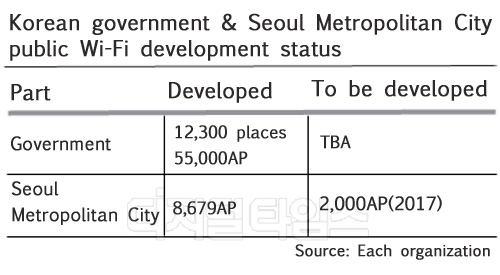Expanding public Wi-Fi and weak security measures
Park Jong Jin | truth@ | 2017-07-26 10:58:39

Local governments such as the central government and the Seoul Metropolitan City are trying to expand the public Wi-Fi, but there is no security measure.
According to the government on July 25, the future creation science ministry has built public wi-fi in 12,200 nationwide from 2012 until now. 7210 were built by the government of those itself and 5090 were built by mobile carriers. In the future, the Ministry plans to implement measures such as building the government itself, cooperating with local governments, and opening WiFi for mobile operators within the year, and plans to expand public wi-fi from next year by securing a budget. Separately, the city plans to provide more than 10,000 public Wi-Fi access points (APs), including 8679 built by the end of last year, with 2,000 additions in the second half of this year.
In this way, both central and local governments are expanding public WiFi, and vulnerability of router and network equipment is increasing. According to the Korea Internet Development Agency, four public Wi-Fi vulnerabilities have been identified in the first quarter of this year, but 12 cases were found in the second quarter. A security industry expert said, "Unlike wireless internet, which is set to be used only by customers, the public wifi used by an unspecified number of people can cause serious damage and subsequent actions, which can be difficult to follow up. I need to be systematically managed as much as we can."
However, the government has delegated operations to mobile operators including security. At present, the entire government AP and 60% of the public Wi-Fi AP in Seoul city are divided and operated by 3 major mobile carriers. The Seoul Metropolitan Government also has security controls such as blocking malicious code through a firewall and an infringement countermeasure system for 3,000 APs that are built by themselves. But, the rest of the telecommunication building AP is responsible for the security of the mobile carrier.
As a result, the public wi-fi operators seem to have difficulty in organically responding to security incidents. An official of Seoul Metropolitan City said, "More than 3,000 APs built by themselves are directly protected through firewalls and intrusion prevention systems (ISPs). Security industry expert said, “It is not easy to share information about the mobile network or AP with internal confidentiality.”
Another expert of the security industry pointed out, "Public Wi-Fi is a service operated by the public from the viewpoint of the user. In view of the fact that the authorities and the local governments are responsible for accidents, it is necessary to prepare security measures such as periodic simulated hacking tests.”
By Park Jong Jin truth@
